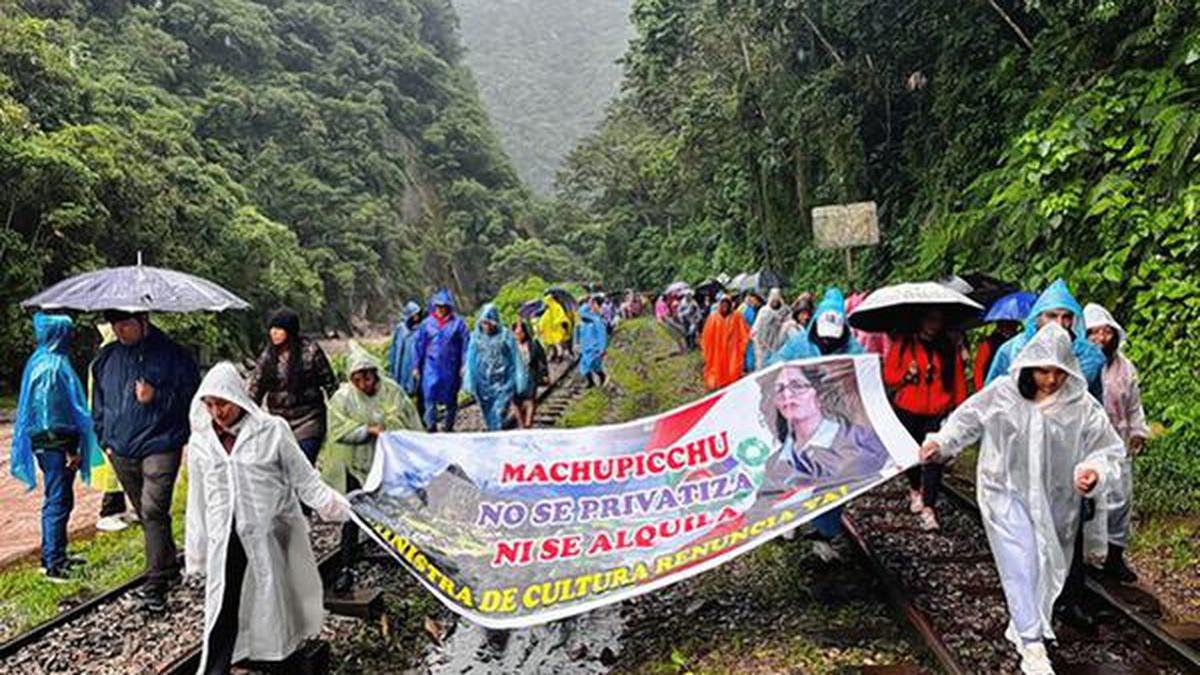Tour operators and residents demonstrate on the rail tracks near Machu Picchu.
| Photo Credit: AFP
Visitors to Peru’s iconic Machu Picchu site were met by protesters angry with the government for privatizing ticket sales at the Inca citadel.
Launching what they called an “indefinite strike,” tour operators and residents closed shops and blocked the tracks of a tourist train, compelling those on board to don rain jackets and walk the remaining three kilometers to the entrance.
“We are against the systematic privatization of Machu Picchu. The people are not in agreement; this (ticketing) company was contracted illegally,” community representative Darwin Baca told AFP.
The demonstrators banged on drums, waved flags and demanded the minister of culture resign.
A local collective claims that the company granted the contract for ticket sales, Joinnus, will make as much as $3.2 million per year in commissions from the new system, which started on Saturday.
As evening fell, police used tear gas to disperse a group of protesters blocking the railway line, according to an AFP reporter at the scene. Authorities have not reported any arrests.
Rail operator Ferrocarril Transandino announced it would suspend service on Friday between Ollantaytambo and Machu Picchu due to the clashes between protesters and police.
“We adopted this measure to safeguard passengers and workers of the railway and after learning of the call for new protest actions by social organizations,” the company said in a statement.
Excess visitors
Tourists described their itineraries as being disrupted by the protest.
“In a way, we understand the reason for the strike but still, we as tourists, we pay for a service or tour and it feels a little strange to go through the middle of the strike,” said Colombian tourist Maria Jose Medrano.
The Ministry of Culture however said on social media that visits to Machu Picchu took place “with complete normality.”
Ana Pena, an advisor to the Ministry of Culture, said the ticketing system was about preservation and controlling visitor flow at the popular historic site.
“There is no privatization. We have to ensure absolute control of all the people who enter our citadel,” she said.
“There is a risk that Machu Picchu will be removed from the UNESCO World Heritage list” given that “excess visitors” can lead to deterioration, she said.
Last September, Peru temporarily closed three sectors of Machu Picchu due to the impact of the heavy volume of visitors at the site.
Sitting northwest of the city of Cusco, Machu Picchu was built in the 15th century at an altitude of 2,500 meters (8,200 feet) on orders from the Inca ruler Pachacutec.
It is considered a marvel of architecture and engineering and was declared a UNESCO World Heritage site in 1983.
Tourism is key to Peru’s economy, with the country attracting about 4.5 million visitors prior to the coronavirus pandemic in 2020.
The number of daily access tickets to the citadel increased to 4,500 per day starting this month, from an earlier maximum of 3,800.

